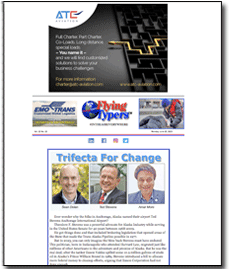|
Mumbai-based Hema Tanna, Director, Manilal Patel Clearing Forwarding
Pvt Ltd, was meant to move to the travel industry but there was something
about cargo that attracted her so much that she joined the logistics company
that her grandfather had started. That was way back in 1998. Today, with
more than two decades in the air freight and ocean freight forwarding
industry, Hema Tanna is considered a ‘hands on’ person with
complete knowledge of the industry processes. Her guiding spirit has been
her father, who unfortunately passed away when she was very young. She
remembers his words to keep focusing on the business and the people who
work with her.
FT: How would
you see 2023 shaping up – air cargo-wise from India. Do you see
difficult times ahead?
HT: The year 2023
will essentially not be an easy year. It will be more about finding stability
and a balance as the last two years have virtually turned the air cargo
business topsy-turvy and it is on its head in terms of freight rates,
capacities, never before heard of Preighters, work-from-home concept,
and so on.
FT: What
is the kind of business you have done over the past year.
HT: Last year has,
by far, been the highlight for most Freight Forwarders. Business has never
seen such growth in numbers, particularly in the Pharma and Medical sector.
The pandemic hugely influenced never before movements such as PPE (Personal
Protective Equipment) kits, medicine, vaccines etc. It was one of our
best years.
FT: Which
are the companies that have entrusted you with their business and why
do they want to keep on working with you?
HT: Most of our
customers were pleasantly surprised how we rose to the situation in the
dire circumstances when airports and sea ports were locked down. Regardless,
we were able to provide them with our services except during the initial
three weeks when the pandemic first hit us. They value our relationship
and have appreciated the fact that we stood by them during these critical
times.
FT: Were
there some extraordinary deals that you did in the past year?
HT: I am not sure
what you mean by deals but something that we had to “deal with”
in a rather difficult way once Covid eased off, was the challenge of meeting
customer demands of delivering their orders – this required a systematic
shift from ocean to air which was not an easy task, particularly with
the limited capacities available during that period. One read that certain
companies were invoking the Force Majeur clause in their contracts but
for MSME companies like us that became a challenge as going ahead we had
to maintain long-term relationships with our customers. Win some, lose
some unfortunately in such cases . . .
FT: How have
you changed the way business is done?
HT: Not only us,
but most businesses have experienced a sea change in their day to day
working. The work-from-home being one the most novel concepts –
we still have few employees who WFH and this works for us in the sense
that our international desks function more efficiently due to time differences.
Another welcome business change was “automation” – customers
who required hard copies of virtually every document have now started
accepting online documents by soft copies saving manpower and unnecessary
printing of paper.
FT: How do
you feel about your work and achievements in logistics?
HT: Very satisfying
indeed! The changes which our industry has seen in the last two years
and the way that our business models adapted to the new normal were an
amazing eye-opener in terms of how fast our industry could change and
adapt to changing times and 'need of the hour' situations. Ultimately,
it’s all about mindsets.
FT: As a
woman, what are the new perspectives that you have brought in?
HT: Sustainable
logistics is undoubtedly going to be the future of our industry. Many
of our customers have pledged to decrease carbon footprints with each
shipment and in fact we are working towards providing an automated calculation
of Co2 emissions for our customers on our website the moment they enter
their shipment details. We are taking the issue of Co2 emissions very
seriously in our organization. We are taking every small step like investing
in EV handling equipment such as forklifts, switching to EV cars, solar
panel energy for our warehouses, plus every little thing like switching
off air conditioning and reducing lights during lunch hour, using the
stairs so on and so forth.
FT: How have
you coped with the ability of the air cargo community to understand the
breadth of change in world trade and commerce?
HT: As I mentioned,
our industry was one of the fastest movers in terms of adapting to our
changing business. Many other businesses simply did not pick up pace but
logistics, I think, was there for the asking – goods had to move,
food had to be on the table, medicines had to be made available, energy
supplies had to be uninterrupted – we as forwarders have always
taken pride in the fact that we can adapt to any and everything thrown
at us and come out winning – that’s one more feather in our
caps!
FT: As a
family business, how are you taking forward the family’s legacy?
HT: Yes, ours is
a family business and is, perhaps, one of the older logistics companies
as we celebrate over 75 years of dedicated service to our customers. The
company was started by my grandfather and thereafter looked after by my
father and now my brother and me. Our success has been that we have come
to the forefront with our customer demands and delivered to their expectations.
Integrity and selfless service is the basis on which we have survived
for so many years.
FT: How strongly
do you feel would the future logistics workforce accelerate gender equality,
create special roles, and give opportunities to more women?
HT: From where
I sit I do not see any gender inequality – in fact I love what I
do and promote women in logistics as and when I get the opportunity to
do so. Logistics is not only a “men only” business as far
as I am concerned and neither have I felt threatened by any gender bias
during my years of service in the industry.
Tirthankar Ghosh
|





